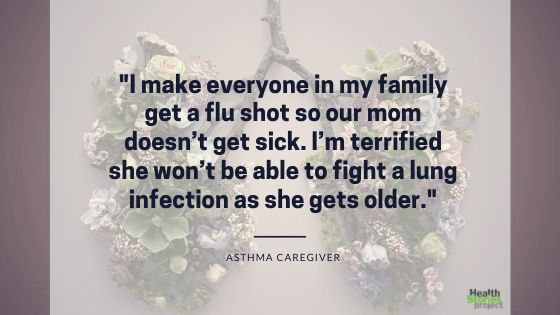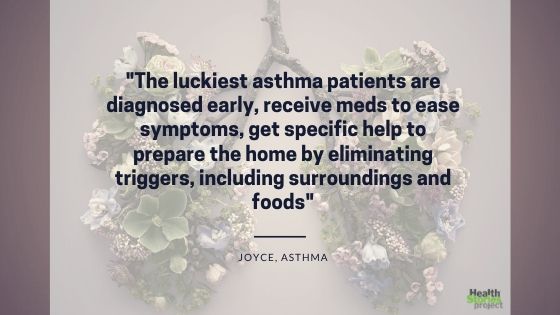I remember vividly when a close family member was hit by an asthma attack that was exacerbated by dust and mold in a large arena filled with horses. When we bought the tickets, we didn’t think about how a simple show could lead to having to call emergency services.
She later told us that she sincerely believed she might die.
As a child, the idea that you could be robbed of your breath in an instant was new to me. I knew my family member had asthma, but I hadn’t before grasped the seriousness of this common condition. Now that I recognize the dangers, I make sure to get a flu shot every year to help my family member avoid seasonal lung issues and I make sure to ask her if she has her inhaler before long trips.
When I set out to write this article, many people in our community who live with asthma shared stories that resonated with my own experience. Joyce, who responded to our story request, had a younger cousin die from an asthma attack when she was just 29 years old and says, “That tragedy has haunted my life, and spurred me to seek help [for my own asthma] earlier rather than later.”
Others describe waking up in the middle of the night gasping for air and the fear of being stuck in big crowds with no escape plan or help.
Candy said: “When my rescue inhaler won’t help, I start to feel panicky, and I know I need to go to the ER. I start feeling anxiety, and like someone is sitting on my chest. I can’t breathe. I feel smothered.”
Asthma is very common. 1 in 13 people has it. Because of this, it’s often easy to forget how serious it really is. That’s why we asked folks living with asthma how it impacts their daily life and what we can do to help.


“Sometimes I dream about running.”
According to a study by the Asthma and Allergy Foundation of America, 97% of those surveyed reported that asthma limits their everyday activities. Many people in our community echoed this sentiment. Donna, who retired from her career after a lengthy absence, says, “it is hard to care for my family the way I want to.”
Currently, there is no cure for asthma. At best, symptoms can be managed or controlled by avoiding or limiting triggers. Here’s how some people who responded to our survey are impacted by common triggers:
“I do not allow carpets in my main living area, or bedrooms. I use cotton, acrylic, and leather for clothing & upholstery. I use a Rainbow Vacuum which catches the dust particles in water. I always carry an Albuterol inhaler.” – Joyce
“I need help cleaning the house because the chemicals bother me too much.” – Anon
“I make everyone in my family get a flu shot so our mom doesn’t get sick. I’m terrified she won’t be able to fight a lung infection as she gets older.” – Anon
“Although I’m still a runner there are many times throughout the year where my asthma has prevented me from running for days, sometimes weeks, at a time. ” – Anon
“I can’t be outside when it’s really cold, I can’t be outside when it’s really humid. I spend a lot of time indoors to avoid triggers.” – Jodi
“Stress triggers my asthma, at times I’m exhausted from just trying to manage my symptoms.” – Jodi


“This problem is far from solved.”
Everyone has heard of asthma but the awareness is just one small step towards solving a much bigger problems. The seriousness of moderate to severe asthma can not be understated. People still need help, the condition needs better funding, and complacency amongst healthcare professionals is considered an issue by many.
Here’s what some had to say on the subject:
“The luckiest patients are diagnosed early, receive meds to ease symptoms, get specific help to prepare the home by eliminating triggers, including surroundings and foods”- Joyce
“[We should] implement national healthcare so that people’s insurance doesn’t determine whether they can afford inhalers and other treatments.
Smoking cessation classes would help a lot of patients who don’t believe that they can quit.
With hospitals cutting back on staff, it is difficult to spend enough time with a patient who may reveal during a casual conversation or during a treatment that there is an occupational or environmental reason for exacerbations. Short staffing is literally killing us.” – Barbara
“I want to be heard by doctors. I want them to hear me when I say I know something is not right. ” – Jodi
Chances are you or someone you know lives with asthma. Leave a comment with how it’s impacted your life and don’t forget to sign up to hear about future opportunities to share your story.


I’m 53 and have been hospitalized nine times because of asthma since 1992. I’m on my last refill of my inhaler and can’t afford to go to the dr. to get more. I’ve lost lots of friends over my asthma problem because they just don’t understand that I can’t not only be around smoke but can’t be around where it’s been. Even my ex-husband got tired of taking care of me. He said “I’m sick of you being sick” which broke my heart.
Hello all of you fighters that live with disease that others can’t understand, you are warriors. Having occasional asthma is bad enough especially if things your friends do trigger an attack but if your love ones don’t understand you fight alone to way too often. For those with moderate to sever asthma things change your life even more drastically and without support it’s very difficult to fight, find support outside of home or your circle of friends if you can. I have moderately severe asthma since childhood but it’s been getting worse and my pulmonologist just tells me to take my medicine or they change me to something I’ve already tried and I feel alone because the one person that is supposed to help throws their hands up and doesn’t believe you. I fired my last pulmonologist and after being hospitalized once again found a doctor that wants to help but he’s not well versed in cases where the asthma is hard to control. I was referred to an allergist that is worth his weight in gold, he has taken the time to investigate my case and find answers. Presently with a lot of work I got a medication approved that kept getting denial letters and my asthma has improved a lot but we both agree it’s still not great. The point I want to make here is that everybody is not the same with this disease and there are other components that can make this worse and shorten lives. Poor people can’t always afford to move when there is mold or neighbors that smoke cigarettes and it can greatly worsen the disease of some asthmatics. Please keep in mind that if you are not getting better there is a reason and if you don’t get answers demand them or get a new doctor, unfortunately many can’t do that either because of our system of medical care. I was diagnosed with ABPA, allergic broncho pulmonary aspergillosis, to date the only ones that get this disease are asthmatics or those with cystic fibrosis. Two pulmonologist agreed with the diagnosis for me but the one I fired disagreed. My allergist told me he doesn’t know whether I have it or not but finds I am highly allergic to aspergillosis and is treating me. He gave me a diagnoses of Asthma with COPD overlap syndrome, that was enough to refute the diagnoses his other colleague gave me and to get funding to help with getting me this new medication. Keep fighting my brother and sister warriors, sometimes you may feel like giving up like I have too but it’s worth it to die fighting because you may win some of the battles and reap the benefit of better care. Asthma is still looked at as something benign by the general population and we need better care and better medications while making the public aware of the dangers and hardships those with this disease live with.
THANKS EMMITT,PLEASE SHARE THE NAME OF YOUR MEDICATION WITH ME.I HAVE THE SAME DIAGNOSIS AS YOU.